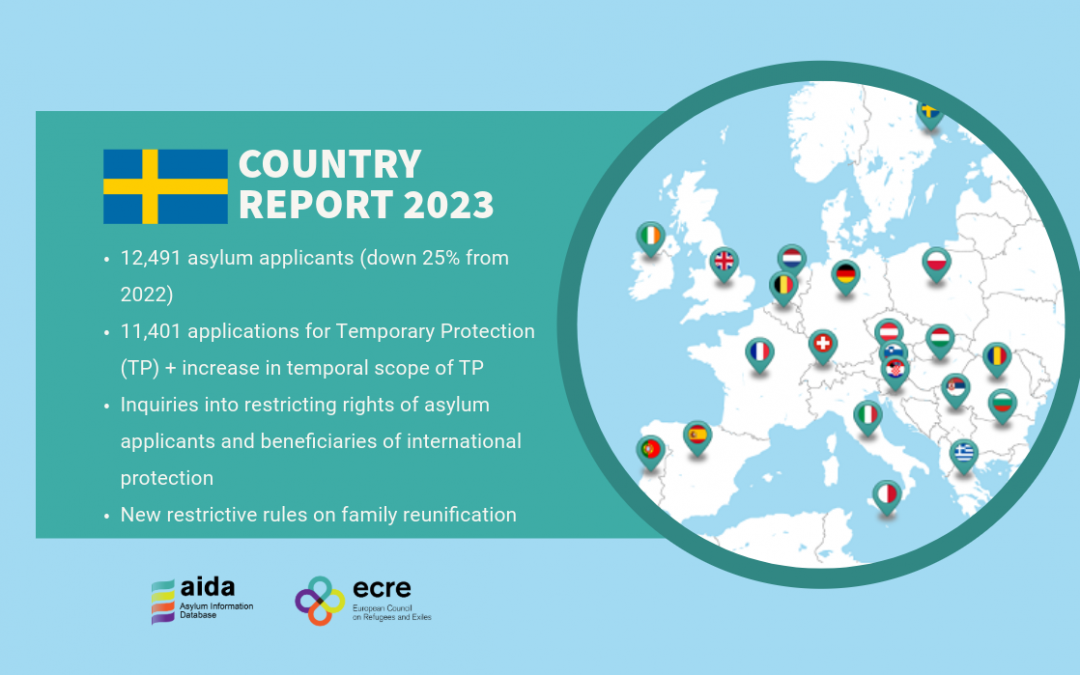The updated AIDA Country Report on Sweden provides a detailed overview of legislative and practice-related developments in asylum procedures, reception conditions, detention of asylum seekers, content of international protection and both the procedure for and content of temporary protection (TP) in 2023.
In 2023, 12,491 applications for international protection were lodged before the Swedish authorities. This represented a of 25% decrease compared to 2022 in the context of a 17.6% EU-wide increase. The most represented countries of origin amongst asylum applicants remained Afghanistan, Syria and Iraq. The overall recognition rate decreased slightly to 34%, compared to 37% in 2022, albeit with higher recognition rates inter alia for Syrians (84%) and Afghans (63%). Having already drastically lowered its resettlement commitment from 5,000 in 2022 to 900 in 2023, Sweden ultimately only resettled 540 refugees in 2023.
The Swedish Migration Agency registered 11,401 applications for TP in 2023, down from 50,357 in 2022. Of those examined on the merits (10,851), 99% were granted a residence permit. In December 2023, the government decided to extend the personal scope of TP to include all persons legally staying in Sweden before 22 December 2023, if they belonged to the mandatory scope of TP per the Council Implementing Decision (Article 2.1). This was most relevant for Ukrainian nationals who had applied for asylum prior to 30 October 2021 – the scope had already been extended in 2022 to include those who had arrived between 31 October 2021 and 24 February 2022 – and thereafter had been staying legally in Sweden, regardless of their grounds for residence, who were also now included in the personal scope of TP.
General elections in September 2022 led to the adoption of the Tidö Agreement between the parties that formed the new government and the Sweden Democrats. Pursuant to the agreement, a number of legal amendments took effect and several government inquiries into further restrictions were launched in 2023. An inquiry chair was appointed in October 2023 and tasked with (i) suggesting which changes could be made to restrict the rights of asylum seekers to a minimum level in accordance with international obligations; (ii) investigating whether it would be possible to only grant temporary residence permits, to stop granting permanent residency permits and to withdraw existing permanent permits and replace them with temporary ones; and (iii) examining the current criteria for legal representatives and interpreters.
In addition, the scope of humanitarian protection in Sweden was restricted on 1 December 2023 by the entry into force of a legal amendment which limited the exemption from requirements for children with a special connection to Sweden and completely deleted the exemption from requirements for adults in the same situation.
The Tidö Agreement also sought to restrict rights related to reception conditions. An interim report published in 2023 included proposals for ending the current system in which asylum seekers are able to choose and arrange their own accommodation, and replace it with an approach focused on transit centres where asylum applicants would stay for the entirety of their asylum procedure. A directive to investigate other restrictions regarding the option for asylum seekers to choose where they stay is expected in May 2024.
Regarding detention, a report based on the Tidö Agreement in early 2024 included proposals for further restrictions for visitors, the introduction of room inspections and increased surveillance and security checks. Parliament is expected to vote on the legislation later in 2024.
Finally, the rules on family reunification of resettled refugees and beneficiaries of subsidiary protection have also been significantly restricted. Since 1 December 2023, beneficiaries of subsidiary protection are no longer exempted from maintenance requirements (which consist of having accommodation of sufficient size and standard, and a financial requirement) even if they apply within three months of receiving status. Resettled refugees are still exempted from these requirements for three months, but the three months are now counted from the day they are granted the status, which happens before their arrival, rather than from the day they arrive in Sweden. Since 1 December 2023, a residence permit may be denied if one of the spouses or cohabiting partners is under 21.
The full report is available here, and the temporary protection annex to the report is available here.
For more information about the AIDA database or to read other AIDA reports, please visit the AIDA website.

